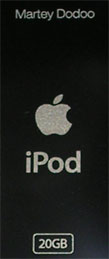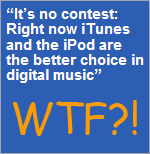False Assumptions about FairPlay 17 years, 3 months ago by Martey Dodoo

Over at Gadfly, Peter Mulcahy complains about Randall Stross' recent article in the New York Times, which rightly castigates Apple for the limitations of the FairPlay DRM with which it encodes audio and video purchased from the iTunes Store. While I think commenter Markus Kolic is right in noting that Stross seems to be misreading the Melanie Tucker case, Mulcahy is being hyperbolic when he calls Stross' work idiocy and whining:
Buyers know going in that the music they purchase goes on the iPod, and nowhere else; likewise, they know that the music they buy elsewhere goes nowhere but their iPod. If you don’t like it, don’t sueâ€"instead, don’t buy an iPod. You can always buy a Zune, you anarchist luddite.
If only it were that simple. Even if we assume that all buyers of the iPod are as well educated about the device's limitations as Mulcahy (a dubious assumption), the shortcomings which prospective iPod owners are willing to live with now are could easily become stricter in the future. For example, the favorite DAP of anarchist Luddites does not play audio encoded with previous iterations of Microsoft's DRM - which includes music from Napster, Rhaspody, and other online music stores. I doubt that people who
Before someone decides to write a derogatory comment claiming that I am stupid to expect anything else from a company like Microsoft, note that Apple has consistently increased limitations on the rights of users of iTunes and the iTunes Store. Mulcahy, however, believes that these increases are valid in the face of a ravenous record industry:
I’m pretty tired of all these people who want to completely obliterate any reasonable copyright standardâ€"not to mention the industry morons on the other side, who seem bent on self-destruction. Apple has rescued the music industry, creating a reasonable standard to prevent widespread piracy while protecting the consumer’s interests (and its own). Let’s not cry about it if we don’t like it. It’s a free marketâ€"vote with your wallet.

I am not sure what Mulcahy was reading that prompted him to write the above paragraph, but it was certainly not Stross' article, which focuses neither on copyright (which is never even mentioned in the article) nor on Luddites in the recording industry (Stross profiles Terry McBride, the CEO of Nettwerk, a progressive record label with an excellent track record on issues of technology). The article is about how Apple (and Apple alone) benefits from DRM. From Jon Johansen comes a link to a May 2004 article by Fred von Lohmann of the EFF:
On a panel a few weeks ago, I asked the head lawyer for Apple's iTunes Music Store whether Apple would, if it could, drop the FairPlay DRM from tracks purchased at the Music Store. He said "no." I was puzzled, because I assumed that the DRM obligation was imposed by the major labels on a grudging Apple.
von Lohmann goes on to explain how FairPlay's real purpose is to help Apple sell more iPods, not to save the music industry from piracy, nor consumers from the music industry. The only entity Apple cares about is Apple, and anyone who believes otherwise is deluding themselves.